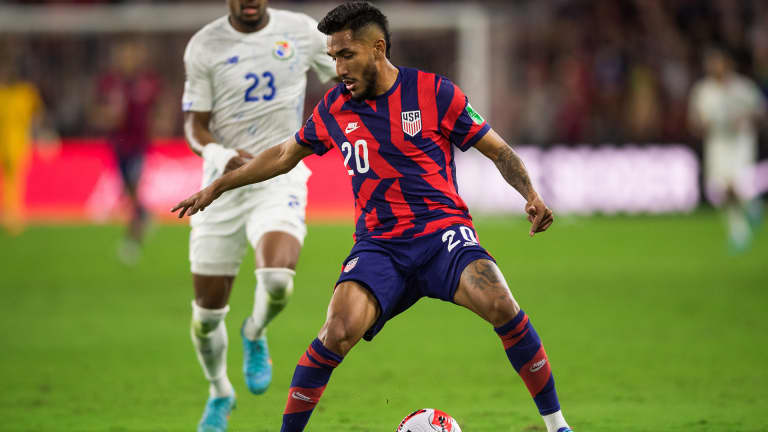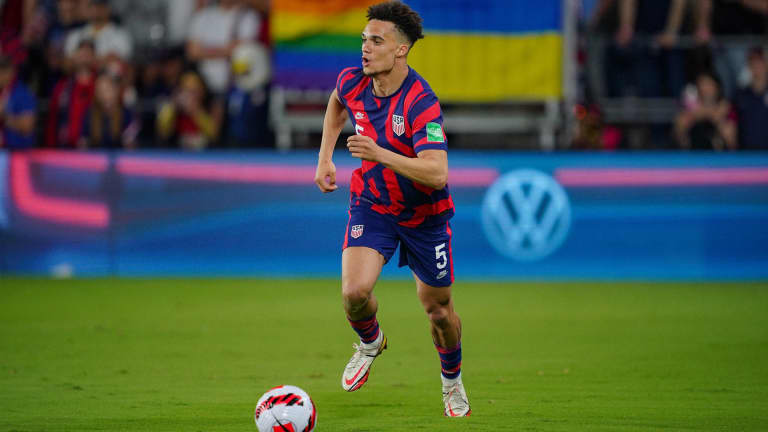This quiet period of US men’s national team news, which took effect a month-and-a-half ago when the World Cup draws were announced and has been in place since then, is about to end.
The US face a pair of friendlies (vs. Morocco and Uruguay) and a pair of Concacaf Nations League contests (vs. Grenada and El Salvador) starting June 1 and running to the month’s second week. As such, head coach Gregg Berhalter is, according to reports, set to announce the roster early next week.
Berhalter has said, in various interviews, that this roster is mainly going to be composed of the regulars. There are only a half-dozen games scheduled between now and the Qatar 2022 World Cup, so it’s much too late in the day to blow a camp on a completely experimental group – building chemistry, continuity and familiarity is the key.
But it won’t be only those guys. Let’s start with this: injuries have robbed the US of at least three probable starters, and as many as five, plus one top backup:
- We likely won’t see Miles Robinson until 2023 following his ruptured left Achilles tendon.
- Hopefully, Gio Reyna, who is sidelined with another leg injury, will be ready to go before then.
- Jedi Robinson was shut down for the season after Fulham won promotion to the EPL.
- Weston McKennie has been spotted in training for Juventus but hasn’t played yet.
- Same for Sergino Dest with Barcelona.
- Robinson’s most likely replacement, Chris Richards, had his season shut down in mid-April with a tendon injury in his thigh.
We’ll use this as a jumping-off point for what Berhalter needs to figure out and prioritize over the next month.
Priority No. 1: Figure out a CB combo
Nobody, I think, had a better 2021 than Miles Robinson. He finally got his shot with the US and took it with both hands, putting in a monster performance at the 2021 Gold Cup – which came with an extra-time game-winner against Mexico in the final – and spinning that, plus good club form at Atlanta United, into a regular role with the US.
That regular role became a full-time starting role as qualifying progressed, and by about the third window, it became a starting role with, usually, Nashville SC's Walker Zimmerman. While every spot on the field is about talent, certain spots are just as much about partnerships and chemistry, and these two discovered it instantly.
The numbers tell the story, as the US went 7W-1L-1D (the one loss was the Zack Steffen calamity at Costa Rica on the final day of qualifying) with a +16 goal differential when those two guys started together. It seemed like the US had their center back pairing locked in.
If Richards had not picked up that thigh injury – when he did, Hoffenheim sporting director Alexander Rosen said he was set for “a long spell on the sidelines,” though sources say he could be back as soon as this camp (it’ll be cutting it close) – then the path forward right now would be clearer, in that Richards would be the obvious choice to get Robinson’s minutes. But he did, and even if he’s in the camp, it seems unlikely that he’ll be either sharp or fit enough to get truly significant minutes.
So Berhalter has to go a bit further down the depth chart. Most likely that means Aaron Long, who was probably the No. 1 center back on the depth chart before an Achilles’ tear of his own almost exactly one year ago, and Mark McKenzie, who made a late-season push for honest minutes in Belgium before seemingly losing his spot again over the past week. Erik Palmer-Brown, who had a productive season at Ligue 1's Troyes (loan then sale) and made a cameo in the draw against Mexico during the last round of qualifiers, is probably either next on that list, or even with McKenzie.
My guess is the vast majority of minutes will go to Zimmerman with one of Long, McKenzie or Palmer-Brown, or Richards if Richards is actually good enough to go. I think other guys will be brought in – Cameron Carter-Vickers being front of mind for folks at the moment – but it feels like a stretch to imagine Berhalter going in an entirely new direction unless CCV absolutely blows him away.
For what it’s worth, I do not believe John Brooks will factor in, though I could be wrong about that.
Regardless, the US must come out of this camp with a degree of confidence in the level of familiarity exhibited by at least one of the potential CB combos. That partnership, whoever it’s between, matters a ton.
Priority No. 2: Open competition for the No. 9
It’s pretty well understood, for obvious reasons, that there is no clear starter at the No. 9 for the USMNT right now. What’s less well understood is that Berhalter might not feel that way.
He saw something in Jesus Ferreira as a potential high-level center forward when most did not, and threw him to the wolves in qualifying. Ferreira didn’t exactly light it up, but on a small sample size (about 250 minutes) the FC Dallas homegrown led the entire Ocho in xG+xA per 90. That is encouraging.
You know the drill with Ferreira, though: he’s a false 9 (neither he nor Berhalter embraces that term, but that’s ok). If you want one stat that sort of defines what that means, go with the fact that Ferreira is leading the MLS Golden Boot presented by Audi race while, as per Second Spectrum, he is dead last among starting MLS center forwards in number of runs into the box per 90. His job is still to score goals, but he doesn’t score ‘em in the ways other guys do!

There are three other, truer center forwards making a case for themselves, all three of whom have tons of USYNT experience, but virtually zero full senior national team experience:
- Haji Wright is wrapping up a breakout season (15g/2a in about 2000 all competitions minutes) with Antalyaspor in the Turkish Super Lig.
- Jeremy Ebobisse, finally playing as a full-time center forward in San Jose, is just behind Ferreira in the Golden Boot race with seven goals in about 930 minutes.
- Brandon Vazquez has 6g/2a in about 900 minutes for Cincy and the best underlying numbers of the bunch.
I think Ferreira’s going to be on the plane to Qatar no matter what. It’s a combo of his productivity, plus how distinct he is (there are no other false 9 types in the US pool), plus the fact that Nico Estevez’s system in Dallas is so similar to Berhalter’s with the US. But on top of that, Ferreira has leveled up as an athlete in the past 8-10 months. He is not just quick anymore; he’s actively fast and can run away from backlines.
But it’s an open competition beyond him, and my hope is that one of Wright, Ebobisse or Vazquez (and to be clear, I have no idea whether any, all, some or none of the above will even be invited to camp) gets a chance, in this camp, to show they belong in the mix for a ticket to Qatar.
None of this, by the way, is meant to rule out Ricardo Pepi or Daryl Dike. But Pepi has not scored a goal in almost eight months and Berhalter intimated he was going to give the kid a break to rest and recharge, while Dike has been injured and didn’t impress with the US when handed a chance last summer.
I do, however, suspect that Jordan Pefok’s race has been run. If the guy who’s brought in because all he does is score goals doesn’t actually score goals when given ample opportunity to do so, then it’s understandable that the coach would look in another direction no matter what said goalscorer’s club form is like.
Priority No. 3: Add layers to the press
The US, in the final qualifying window, mostly gave up on positional play and became a pressing and transition team. While I think that probably plays better toward the strengths of the roster, I hope positional play isn’t gone for good. It can be especially useful against a team like Iran, for example, in Group B play at the World Cup.
Regardless, if more of the USMNT’s attack is coming via the press – and it has been – then Berhalter needs to diversify how his team presses. For the past year-and-a-half it’s been out of the same basic shape with the same basic triggers, and while it was good throughout qualifying, it also became fairly predictable. And it’s a pretty good bet that all three opposing coaches will have watched dozens of hours of film on the US between now and November, so adding new layers and wrinkles, starting with this camp, makes sense.
This, by the way, is a good reason to have Reyna, Antonee Robinson, McKennie, Dest and Richards at this camp even if they can’t play. Chemistry and camaraderie matter a ton, and so does early, hands-on implementation of new tactical concepts.
Priority No. 4: Left back
I didn’t see a reason to be confident in any of the left back options beyond Jedi, who was indispensable in qualifying. I had hoped, in my heart of hearts, that Kevin Paredes would get to Wolfsburg and take them by storm, but it didn’t happen that way – the D.C. United homegrown product played all of 13 minutes since his arrival in January.
Honestly, I’d call him into this camp anyway. Paredes is a special talent and he’s like-for-like with Jedi, which is important for this position given how the US play.
The other options are a pair of right-footed left backs in DeJuan Jones (New England Revolution) and Joe Scally, as well as a pair of left-footers in George Bello and Sam Vines, neither of whom impressed when they got the chance.
A longshot here is RBNY’s 19-year-old homegrown John Tolkin, who’s been excellent in a starting role for one of the best defenses in MLS for a full year now. I would love to see him there, but RBNY’s system is so different, and Tolkin’s skill set is so different, that I’d completely understand if Berhalter’s not considering him at all.

Closing notes
There are, of course, other things that matter in this camp. I’m curious to see, for example, if Djordje Mihailovic or Paxton Pomykal can push into the group (again, there’s no guarantee either will even get called), and I’m hoping that Berhalter gives James Sands a full game as a No. 6. I also want to see Matt Turner play a bunch of goalkeeper minutes to get his rhythm with this team back.
But those are lesser priorities, as is potentially cap-tying any of the dual nationals who are flirting with other countries (Poland, for example, are putting the full-court press on Chicago homegrown GK Gaga Slonina, calling him in for their Nations League games). Berhalter has been good about both avoiding predatory cap-ties and winning those battles when he feels the need to lean into them, and I don’t think there’s any particular reason to change his approach here.
There’s just a huge need to get this team ready for November. Everything else takes a back seat to that.













